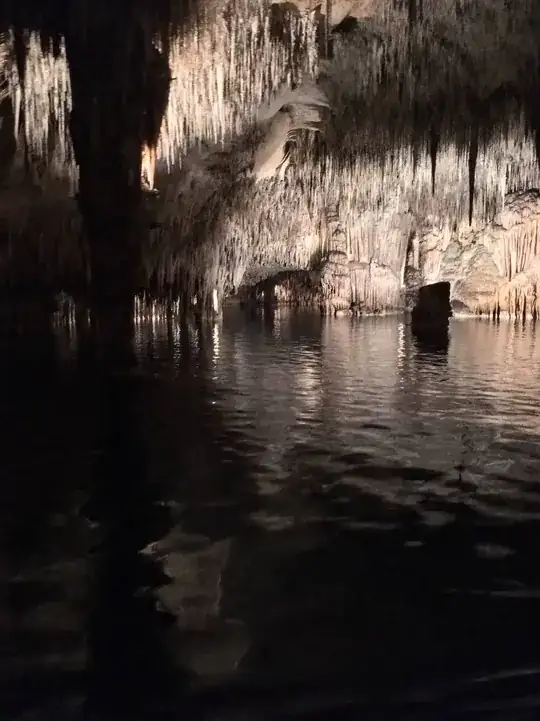I'm picturing a world without oceans. I'm not after Arrakis; I want a quite lush surface. I'd like no surface water at all, but I'm concerned that makes evolution impossible. (I imagined using chemotrophs to get around it.) I want a "sea level" pressure of 2-6x Earth. If there's surface water, it'd be "above sea level", no? Or do I also get superheated water/steam below that? I picture "sea level" as a "cloud deck", where water runs off continents in waterfalls & vaporizes at the heat/pressure limit, forming permanent, global cloud. This separates the world into two societies/species, above/below the deck. Any thoughts on the ecology & weather? Did I miss anything? (If it matters, my model is Earth, with no changes except as noted.)
-
6Cool idea. Higher pressure atmosphere with 30% oxygen will burn things. Not sure you need that. – Willk May 03 '19 at 01:57
-
3You should better ask one single question and with a manageable scope. Else it can be too broad for our standards. – L.Dutch May 03 '19 at 06:13
-
1higher pressures make liquid water more likely, not less likely. And such a temprature differential is not stable convection and evaporative cooling will disperse heat very quickly. – John May 03 '19 at 12:26
-
How do you feel about lots and lots of seas? A golf ball like surface might hold many seas without a large ocean. – John May 05 '19 at 21:45
-
I have ocean floor maps of Earth, & I wanted to use that geography, for simplicity's sake, just strip the water off. – vulcanforger May 07 '19 at 04:00
4 Answers
Underground Water
If there is no surface water on your world, perhaps there are underground rivers and lakes. Plants could evolve to grow their roots into these waters and their leaves would grow on the surface. Imagine caves like these where roots hang from the ceiling as though they were stalactites all around the world.
Animals would need to go underground to get water and travel to the surface to get food if they were herbivores.
Your humans would have a heavy focus on wells and, eventually, underground water pumps.
If you wanted rain, you could say that the water the plants draw up evaporates and turns into clouds. Eventually the water would fall back down again and be absorbed back into the earth. You could also have it so rain is rare and, when it does fall, animals gather around lakes and rivers like they do when the River Nile floods.
- 5,638
- 15
- 49
-
3This could work. A significant number of animals today get all their required water from the food they eat. This could be a likely evolutionary strategy for this waterless world. I would be concerned about the climate though as oceans act as enormous heatsinks that stabilise the temperature of the planet. Without them, it's likely to swing between really hot and very cold. – Ynneadwraith May 03 '19 at 08:49
-
you can't have underground water with no surface water unless your planet is perfectly smooth. otherwise water will pool in low spots and be complete desert in high places. groundwater on earth flows into hte oceans. – John May 04 '19 at 23:21
-
Also if life is dependent on ground water anywhere with shallow bedrock or clay rich soil will be desert. – John May 05 '19 at 03:30
-
@John “You can’t have underground water with no surface water?” Well why not? You could simply have an ocean under the surface if that is what’s required. When i mentioned underground water, i did not mean “ground water”, i meant huge underground caverns flooded with it, the roots of the plants push down through the earth and into the caverns to get water and drag it up to the surface. The water content of the soil, in this case, could be irrelevant. Finally, i also mentioned how there could be rain despite the lack of surface water, allowing plants everywhere to get water. – Liam Morris May 05 '19 at 07:36
-
How can you have caverns with no oceans, where did the limestone come from? Also you can't have a planet cover with caverns, Its hard to have any single geological condition on a global scale. again the same problem applies anywhere without caversn will be desert, which will be the majority of the planet. – John May 05 '19 at 12:37
Our oceans come from volcanic activity lifting gases out out of the world's core. A world like you describe naturally forming to be volcanic enough to support chemotrophs without oceans is not very likely.
The closest you could come is a runaway greenhouse world like Venus with VERY tall mountains. At 55km, Venus's atmosphere is Earth like except for all the sulfuric acid which your chemotrophs would love anyway. The regions below would be kept way too hot by the runaway greenhouse effect to support liquid water.
Another Option: Earth's atmosphere has lots of Oxygen and not much Carbon compared to the norm because our primary producers (plants) extract and sequester so much Carbon. It could be that your chemotrophs extract and sequester exceptional volumes of the Hydrogen or Oxygen from water in much the same way. They drank up the oceans over billions of years, now most water components are cyclically locked where the chemotrophs destroy the water, and the high elevation organisms reform it as their own biological byproduct, but mostly the components of water are sequestered deep underground in this world's version of fossil fuel sites.
- 92,078
- 7
- 128
- 363
-
But plants on Earth sequester hydrogen and oxygen (and nitrogen) as well as carbon. All life is made from those four elements, plus a few trace elements needed in small quantities. – Mike Scott May 03 '19 at 06:09
-
I've been presuming low (or no) reliance on water as a necessary, based on its absence at surface. I take it the complications to biology that introduces, if changed to something else, are fairly enormous? The denser atmosphere would seem to influence what might work (or be available). If underground water is still a major resource, it seems likely "leakage" from aquifers would tend to produce waterfall effects (as mentioned) in a lot of places, with sometimes unexpected results: horizontal steam jets, for one? Plus wind effects in the (deep) canyons & valleys, which could be awe-inspiring. – vulcanforger May 03 '19 at 09:54
-
the life could sequester the water in other ways like wayne barlowe's expeditions planet darwin 4, which has no oceans but does have a jelly sea. – John May 05 '19 at 03:28
Of course, the warmed up turnaround of the water can support lush plant life without oceans. But such intense whirling will cover all levels least the difference in height will be really great.
The target of the question can be reached also if oceans are underground ones. But then you have to invent some plants with extremely long roots that will raise the water from the depths to the surface to create new rains.
- 1,894
- 8
- 10
Read up on Rocheworlds and their shared atmospheres here:
Could two planets be tidally locked to each other so close they share their atmosphere?
Your planet starts like Mars, 500,000,000 years ago. Once wet and full of life, its internal fires have cooled and it is losing its atmosphere and water to space. It is drying, and dying. To save the planet and its inhabitants a second planet or great moon is moved into position.
This new partner is a fragment of a gas giant, made of water, ammonia and methane. It is so close that gravity pulls the gases away and down to replenish the grasslands and steppes of your dry planet. More importantly the tidal flexing caused by this planetary dance heats up your planet, restarting its protective magnetosphere.
sources for images:
https://i.stack.imgur.com/wBCel.jpg
https://www.stephen-weaver.com/photo/prairie-sunset/
- 304,738
- 59
- 504
- 1,237
-
-
@John: The oceans dried up in second paragraph. A gentle rain from the new partner keeps the dry lands able to support grass. – Willk May 05 '19 at 00:02
-
1If that rains happens for more than few years you have oceans again. If it doesn't you have deserts. sharing the atmosphere doesn't solve the problem it just makes it more complex. – John May 05 '19 at 03:22
-
@John - You are correct that the shared atmosphere is not an equilibrium solution. This planet is on the way from where it was (dying and drying up) to somewhere new as regards hydroecology. In this scenario the terraformers were trying to save this world with gentle rain, not some deluge that would fill the ocean in a few years. A few million years, yes! – Willk May 05 '19 at 18:57
-
I don't think you understand how rain works, it takes between a couple of weeks to a couple of months for rain to reach the ocean, thanks to rivers. If it has been raining for years you have oceans. They may be shallow oceans but you have oceans. – John May 05 '19 at 21:40
-
@John - check it out. River disappears into desert. https://earthobservatory.nasa.gov/images/51190/okavango-swamp-botswana – Willk May 06 '19 at 03:41
-
that works because it is desert which the OP has stated they do not want. it is a tiny watershed. – John May 06 '19 at 13:00
-
@John - really I was shooting for a planetwide steppe. A steppe is not desert. The rain is enough to sustain grass and shrubs and that is all. – Willk May 06 '19 at 20:38
-
there is really no way to have a single biome across an entire planet, except maybe deep ocean. – John May 07 '19 at 02:07
-
@John - I think you are right. I wonder if a shared atmosphere would produce uniform rains? Temperature differences related to axial tilt and distance from poles would still apply and affect biomes. But on earth you can find grasslands at just about any latitude; especially if rainfall is low enough trees can't take over. – Willk May 07 '19 at 13:48
-
The problem is getting uniform rainfall, to get that your land needs to be flatter than a billiard ball and uniform in color, and it still won't be work because of hadley cells. – John May 07 '19 at 14:03
-
I appreciate the thought, but a gas giant that close introduces more issues I don't need tot deal with (beyond "how it got there"). Also, as noted, I don't (really) want rain (or, indeed, plants & animals needing water, if I can help it). I'd far rather have a situation where something sucked the oceans dry & pumped the atmosphere full of CO2, so the total pressure went up, leading to something that turns CO2 into minerals, which are used by something that turns minerals back into CO2. – vulcanforger May 08 '19 at 20:32
-
@vulcanforger - I love exotic metabolism questions! Post your desired metabolism / circumstance as a separate question? – Willk May 08 '19 at 20:44

